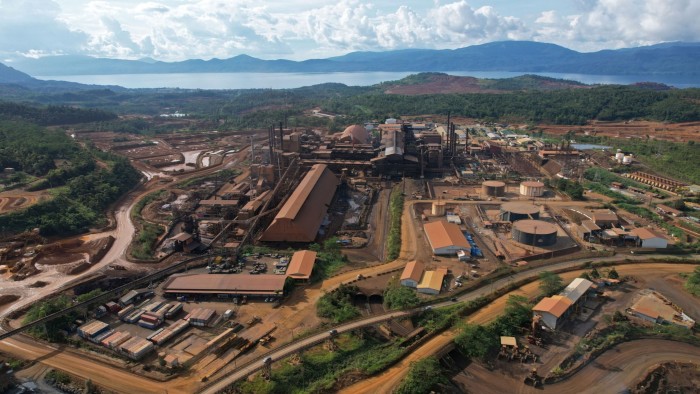Unlock the Editor’s Digest for free
Roula Khalaf, Editor of the FT, selects her favourite stories in this weekly newsletter.
Miners in Indonesia are warning of lower profits and output cuts after the government increased the royalties it levies on one of the country’s biggest export industries.
In a move affecting some of the world’s largest mining groups, including Vale and Freeport-McMoRan, Jakarta at the weekend raised rates for royalties applied to the production of nickel, coal, copper, gold and other minerals. The increases come as the fiscally strained government seeks to raise revenues to fund ambitious spending plans.
Nickel will have one of the biggest increases, with the levy rising from a flat 10 per cent rate to a range of 14 to 19 per cent, depending on the price of the metal.
Indonesia is the world’s largest producer of nickel, a vital ingredient of stainless steel and electric vehicle batteries.
“This is an additional burden, especially because the regulation has been issued during a commodity price downturn,” said Hendra Sinadia, executive director of the Indonesian Mining Association.
Operational costs would go up and profits would take a hit, Hendra said. “It’s possible that some companies may have to reduce their production, or even shut down the mines,” he added.
Commodities are the mainstay of Indonesia’s economy and a big contributor to growth. The country’s nickel sector, in particular, has developed rapidly in recent years, attracting record amounts of foreign investment.
However, the royalty increase comes as nickel producers are grappling with lower metal prices and higher costs from other recent Indonesian regulations.
Mining companies say costs have climbed this year because of an increase in value added tax and a requirement to use more biodiesel as fuel.
Since March, Indonesia has also demanded that natural resources exporters retain more overseas earnings onshore for at least one year to boost its foreign reserves and stabilise the rupiah, which is trading near all-time lows.
Jakarta has defended the move to increase royalties, with one official saying it was part of efforts to ensure “our natural resources give optimum benefits to all Indonesians”.
The country’s fiscal position has been under strain due to President Prabowo Subianto’s $28bn plan to provide free meals for schoolchildren and pregnant mothers.
The government has embarked on a $19bn austerity drive to free up funds for the president’s flagship policy, and is trying to boost state revenue.
It suffered an alarming decline in revenues in the first two months of the year, sparking a sell-off in the stock market and the currency.
Hendra said the government was tapping the commodities sector as it seemed to have very limited options. “The state budget is suffering . . . unfortunately, we are the only hope for the government,” he said.
The Indonesian Nickel Miners Association said the royalty increase was “ill-timed” amid lower metal prices and an escalating trade war between the US and China.
“The increase in royalties has the potential to reduce investment interest in the upstream and downstream nickel sector, weaken the competitiveness of Indonesian nickel products in the global market, and lead to mass lay-offs due to margin pressures,” the group said in a statement.
One senior nickel industry executive, who asked not to be named, said miners without integrated processing facilities would be the most affected. They would probably pass on higher costs to smelters, affecting the entire supply chain, he said.
Additional reporting by Diana Mariska
https://www.ft.com/content/c15a1fce-900c-4d0e-8c52-e86b0330988b


